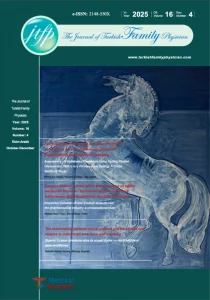Jeffrey Gordon and microbiome research
The human microbiome plays a critical role in immunity, metabolism, neurological function, and the pathophysiology of various diseases. Pioneering work by Prof. Jeffrey I. Gordon has led to the conceptualization of the gut microbiota as a functional “microbial organ”, prompting paradigm shifts in modern medicine. Through transgenic animal models, Gordon’s research has demonstrated the causal role of the microbiome in conditions such as obesity, malnutrition, and immune regulation. Microbiota-directed therapeutic foods show promising results, particularly in treating childhood malnutrition. Microbiome-based approaches now form the foundation of personalized medicine, opening new avenues in disease prevention, diagnosis, and treatment. In this letter, Gordon’s biography will also be briefly reviewed.
References
- Bäckhed F, Ley RE, Sonnenburg JL, Peterson DA, Gordon JI. Host-bacterial mutualism in the human intestine. Science 2005;307(5717):1915-20.
- Xu J, Gordon JI. Honor thy symbionts. Proc Natl Acad Sci USA 2003 Sep 2;100(18):10452-9.
- Walker AW, Duncan SH, Louis P, Flint HJ. Phylogeny, culturing, and metagenomics of the human gut microbiota. Trends Microbiol 2014;22(5):267-74.
- Lab of Jeffrey I. Gordon at WashU Medicine. Archived from the original on December 3, 2024. Retrieved February 25, 2025. https://gordonlab.wustl.edu/ adresinden 02/05/2025 tarihinde erişilmiştir.
- Seo DO, O’Donnell D, Jain N, Ulrich JD, Herz J, Li Y, and al. ApoE isoform–and microbiota-dependent progression of neurodegeneration in a mouse model of tauopathy. Science 2023;379(6628):eadd1236.
- Kim SH, Roth KA, Moser AR, Gordon JI. Transgenic mouse models that explore the multistep hypothesis of intestinal neoplasia. J Cell Biol 1993;123(4):877-93.
- Turnbaugh PJ, Ley RE, Mahowald MA, Magrini V, Mardis ER, Gordon JI. An obesity-associated gut microbiome with increased capacity for energy harvest. Nature 2006 Dec 21;444(7122):1027-31.
- Chen RY, Mostafa I, Hibberd MC, Das S, Mahfuz M, Naila NN, et al. A microbiota-directed food intervention for undernourished children. N Engl J Med 2021;384(16):1517-28.
- de Onis M, Dewey KG, Borghi E, Onyango AW, Blössner M, Daelmans B, et al. The World Health Organization’s global target for reducing childhood stunting by 2025: rationale and proposed actions. Matern Child Nutr 2013 Sep 9; Suppl 2:6-26.
- Van Nood E, Vrieze A, Nieuwdorp M, Fuentes S, Zoetendal EG, de Vos WM, et al. Duodenal infusion of donor feces for recurrent Clostridium difficile. N Engl J Med 2013 Jan 31;368(5):407-15.
- Kootte RS, Levin E, Salojärvi J, Smits LP, Hartstra AV, Udayappan SD, et al. Improvement of insulin sensitivity after lean donor feces in metabolic syndrome is driven by baseline intestinal microbiota composition. Cell Metab 2017;26(4):611-9.
- Takakura W, Pimentel M. Small intestinal bacterial overgrowth and irritable bowel syndrome – an update. Front Psychiatry 2020 Jul 10;11:664.



